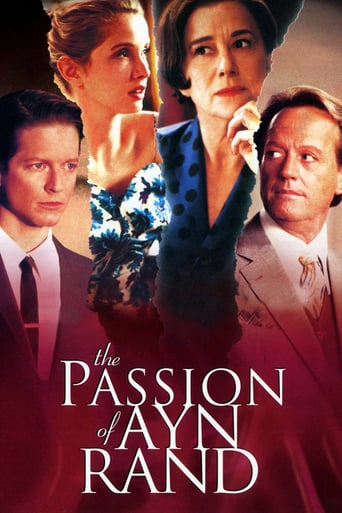ebiros2
It's obvious from the story that this is not an objective biography of Ayn Rand. Ayn Rand is portrayed like some kind of a sex maniac in this movie.One thing is accurately portrayed, and that is that Ayn Rand couldn't live what she preached. Her objectivism fell apart in her personal life, and with the relationship with her husband. She was an author with an idea, but what good is an idea that you can't put to practice ? Ayn Rand's objectivism in this sense was a silly effort to intellectualize.The movie focused excessively on Ayn Rand's personal life. She has done more in society than just live her life in the bedroom. Movie is not a good presentation of her life or her career in this sense.The acting and the production was good in this movie, but the contents fell short of giving a balanced view of Ayn Rand's life.
rajah524-3
But I was. So I'll try to offer some insights. Ayn was an idealistic absolutist. So was young Nathan Brandenburg (at the time). He grew out of it. Barb forgave him (sorta). Ayn was also a narcissist of the first order. She believed she knew the way things should be. When her staunchly anti-socialist books began to "fly" in the '40s (especially on college campuses), her certainty was fueled by a wildfire of intellectual acclaim. Written decades after the events in the film here, Barb's book does a remarkable job of illustrating the popular force of Ayn's views in an essentially conservative era. That Rand's "idealistic capitalism" fell into disrepute in the flood of equally absolutistic, radical liberalism that overwhelmed the collegiate world in the late '60s is no surprise. Ayn was gone when I came to know Nathan a decade later. Objectivism's time had not quite come and gone, but it was slipping. Nathan had -- to some extent -- rehabilitated it as "self-esteem," and the concept took off for a time. Until it, too, began to take a bashing from those who saw it without -really- seeing it. Like so much of what springs forth from the idealistic impulse, objectivism, self-esteem and libertarianism are big concepts that are difficult to maintain in mental, emotional and behavioral grasp. Popular culture will only want as much of such idealism as suits its more mundane purposes. The ideas here that combined with others to become the "human potential movement" of the '60s and '70s were bound to be corrupted. The import of Barbara's fine book is that it makes it clear that the idealist -is- human, and that he (and she) will corrupt their idealisms in the service of whatever narcissistic imperatives they may have. Ayn seduced Nathan to energize her to be able to complete the book. Nathan fell into his own human traps. But it does not mean that the enormous contributions they both made to the further development of self-understanding are any less worthwhile.Unfortunately, the film does not live up to the book. Korder's and Gallegher's screenplay includes all the -facts- that matter, but the presentation of them is flat and, save for those of us who did have some personal connection (even if it's only having been bowled over by -Atlas Shrugged- or -The Fountainhead-), un-intriguing. Or maybe one should blame the director; save for the sex scenes (oddly) and Ayn's reaction to her protégé's replication of her own denied human needs, there's not a lot of "fire" here.And that -is- sad to me. Because the human potential movement in general, and NBI in particular, -are- worth understanding, as much for their considerable contributions to our culture as for the -very- problematic circumstances surrounding many of its biggest "stars" (e.g.: L. Ron Hubbard, Jack Rosenberg a.k.a. Werner Erhard, Jose Silva).The Nathaniel Branden I knew, by the way, had much of Ronald (R. D.) Laing's insight with a very patient and ethical persona. Which is to say that he understood what the "white collar gurus" of the time understood, but he wasn't into using it sociopathically. I'm not so sure, however, that I could say the same thing about some of the people close to him. If you -are- a student (or former member) of the white collar "self-exteem" cults of the '70s and '80s (e.g.: est, The Forum, Silva Mind Control, psi), you may find "The Passion..." interesting for that reason.
Framescourer
A pretty dreadful, made-for-TV look biopic. There's very little character to fire the imagination, let alone any sympathy. The script concentrates doggedly on recording history and trying to explain Ayn Rand's philosophy.We undoubtedly get a horribly disembowelled version of Rand's 'objectivism' - in this film that simply means 'being selfish' and 'uncaring'. Consequently the cast are a bit scuppered. Mirren works fairly hard, with a consistent accent, but the rest are average-to-lame... Peter Fonda's Frank is dreadfully wooden.Further issues: there are lots of close framed shots (which save on having to create period sets); a surfeit of weeping to camera; and there's no big-arc coherence - the opening flashback isn't recalled at the denouement. Cheap and, worse, probably inaccurate. 2/10
rbeschizza
Occupant-1 writes " it would be a good idea in future film treatment of her character to use a European actress, not an American one, to portray her - as done here. It takes a European to play one, since they have a different educational history than what American public education has afforded its actresses. In other words, most American actresses couldn't handle the literate dialog."I'm sure you can see this one coming: In fact, the actress in the film, Helen Mirren, is European. Perhaps one of Britain's most well loved theatrical exports.Occupant-1: Perfect logic, hopeless premise. Exemplary objectivist argumentation.



